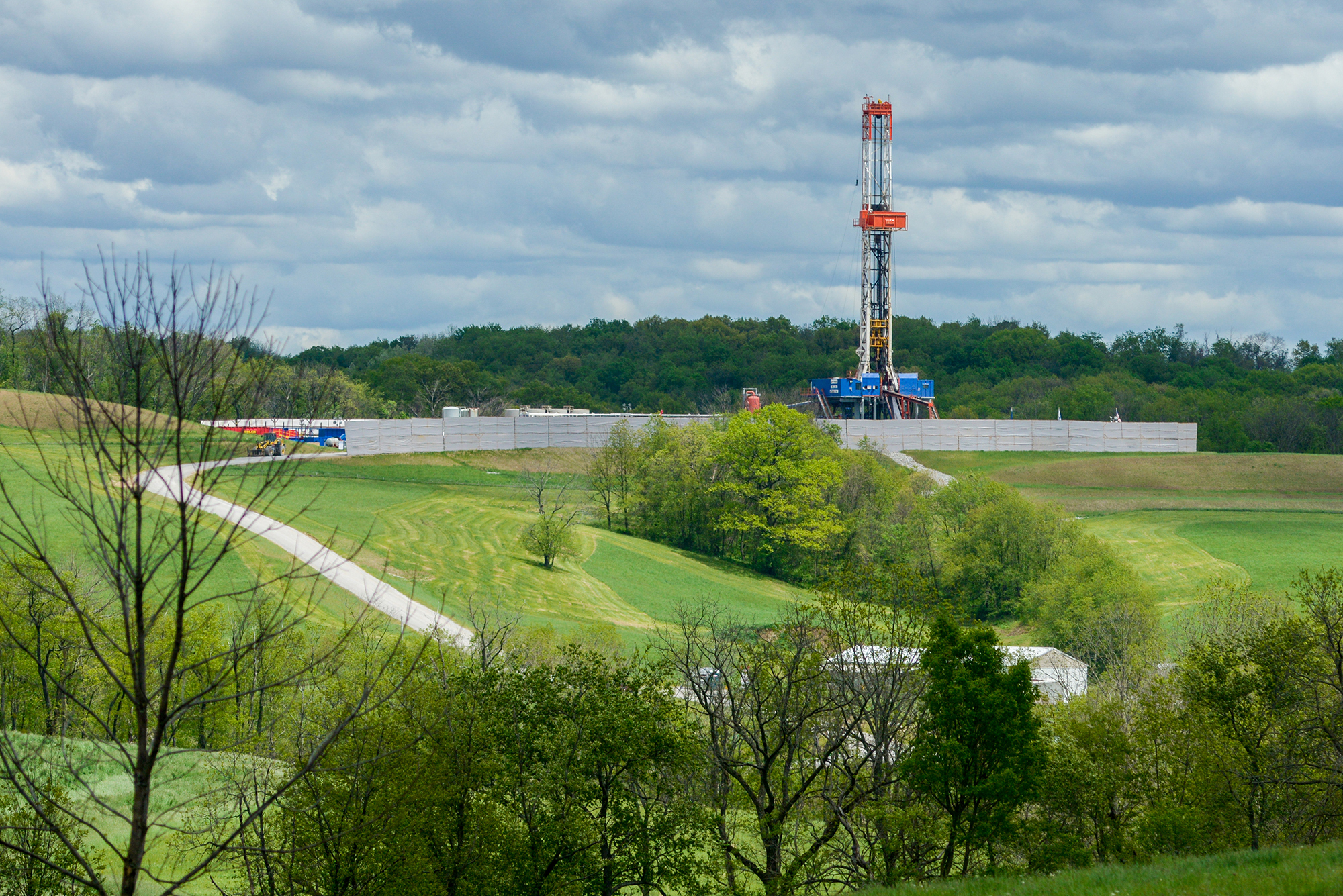
(Illustration by Idil Gözde/PublicSource)
Permitting without public input
Does Pennsylvania’s general permitting process provide adequate oversight for natural gas development?
Aug. 8, 2017
There was once a farmhouse in Washington County where Brenda Vance and her husband, Nolan, dreamed to spend their retirement. In October 2014, hoping to build a house of their dreams and enjoy the country lifestyle, they made a commitment to the property that has been in their family for generations. They started building the house.
But then everything changed. They witnessed a pipeline, a well pad, a compressor station and a cryogenic plant all built within a half a mile of their home in Robinson Township. They had not anticipated what seems like an unchecked flurry of nearby unconventional natural gas drilling (fracking) and how it would impact their lives.
The noise that comes with industrial activity is an obvious annoyance, but the Vances are more concerned with what they can’t see.
“There’s a lot of benzene gas that escapes during the venting, which comes down to the valley ... where we're living,” Brenda Vance said of the known carcinogen. “Everything from this industry oozes.”
Cathy Lodge, a resident of Robinson Township and neighbor of the Vances, has been going to township meetings for more than a decade, and she feels the rising number of natural gas wells and related facilities is harming the community.
“It affects our way of life. We have no say. Industry has all the say. It seems as though the Department of Environmental Protection is in agreement with that,” she said. “And then you have the local officials who are also concurring with that so we have no say again. It’s not right.”

Cathy Lodge meets at the home of neighbors Brenda and Nolan Vance to share their concerns over the drastic growth of natural gas drilling and pump sites in Robinson Township. Within eyesight of the Vance household sits a surveyed piece of land for a future natural gas pipeline. (Photo by Tony Piscitelli/PublicSource)
When Lodge was asked to sign a lease to build a facility near her home, she said no. However, several members of the community signed leases with the company and have gained high profits from it. The local high school has a well pad right across from the school in exchange for royalties.
Brenda Vance said she has seen school buses have to pull over to let trucks pass through. “The tank trucks are all over our roads,” Vance said. “This community was never built for these trucks.”
How has the industry expanded so fast in small-town communities like Robinson Township? And is there a sufficient oversight and assessment of the industry’s aggregate effects?
Residents like the Vances and Lodge would say no. And some environmental organizations would agree.
One of the mechanisms to create and enforce an oversight of the industry are the permits. Regulatory authorities such as the Department of Environmental Protection oversee these permits.
The formats of these permits vary and depend on different factors.
Many of the energy companies that built and are building natural gas facilities near the Vances’ home were granted permission through the GP-5, a type of permit issued by the Pennsylvania Department of Environmental Protection [DEP]. Unlike permits that require an individual approval process, the GP-5 has “the general permit” format that does not require public hearings or comment periods as long as a processing facility or a compressor station does not exceed the threshold of any category of pollution. And that’s a problem, according to environmental advocates who argue that the industry has been using these general permits to approve the expansion piecemeal.
Since 2012, the DEP has approved 461 GP-5s.

With increased drilling activity, narrow roads throughout the Robinson Township area are now used for commercial transportation. (Photo by Tony Piscitelli/PublicSource)

To extract natural gas from the shale rock formations, well pads such as this are constructed to drill thousands of feet into the ground. (Photo by Tony Piscitelli/PublicSource)

With the number of well pads and pump sites increasing in northern Washington County, many roads are being constructed to and from sites to accommodate larger trucks. (Photo by Tony Piscitelli/PublicSource)
The Environmental Integrity Project [EIP] has been appealing to the DEP through written comments to stop this kind of permitting. The group is particularly concerned that the “general permit” format — where the permit is just a standard form that is not customized to the individual project —is not sufficiently adaptable to all of the different types of facilities that it now covers.
While the public can comment on the language in the GP-5 permit form whenever it is modified, the EIP is concerned that the public does not get to weigh in on the specifics of individual projects permitted under the GP-5. They are especially concerned because the proposed revision of the GP-5 includes adding a new type of general permit, the GP-5A, that would allow even more different types of structures and facilities to use general permitting, instead of having to get tailored, individual permits that require public comment periods.
Neil Shader, press secretary for the DEP, said each permit is being held to the same standards in compliance with permitting requirements.
“Prior to authorizing any facility to use a GP-5, a DEP permit engineer will make sure the emissions from existing sources and the emissions from the proposed project continue to be below the major source emission thresholds,” he wrote in an email. “DEP’s air quality compliance enforcement personnel inspect facilities and review compliance reports to ensure that the terms and conditions in each permit are met.”
The Marcellus Shale Coalition, an industry group, said in a statement that the industry is still held to and abides by high standards in the permitting process.
Coalition Spokeswoman Erica Clayton Wright wrote: “Pennsylvania’s world-class regulatory framework enables robust public input and stringent review at numerous points in any project’s timeline. Our industry has a long and clear record of working closely with regulators and stakeholders to ensure that commonsense policies promote responsible natural gas development and expanded use, which are improving our economy and our environment.”
(She also pointed out the coalition’s concern that the Heinz Endowments provides funding to PublicSource and to the Environmental Integrity Project, one of “the activist groups opposed to this positive progress.”)
GP-5s are said to be reserved for facilities that are “minor air contamination sources,” according to a DEP fact sheet.
That’s no comfort to the Vances or to Lisa Graves-Marcucci, the Pennsylvania coordinator of community outreach for EIP. Graves-Marcucci says the group is working “to obtain full transparency” in all permitting.
“Unfortunately,” she said, “the PA DEP does not consider the cumulative impacts of operations on local communities and, therefore, some communities are literally being surrounded by massive oil and gas infrastructure and have been stripped of their opportunity to be heard.”
That’s why Brenda Vance and Lodge had to take matters in their own hands. They had a hard time keeping track of the footprints of the industry and spent at least six months creating their own map. With pushpins, they marked all the new gas industry projects that have popped up in their community of Robinson Township in Washington County.
"We were just trying to have a map to go to community meetings. We spent one summer of heavy hard work,” Vance said.
Right now, concerned citizens in Robinson Township and the EIP are focusing on the next project: the ETC Northeast Pipeline’s plan for a Revolution Cryogenic Plant.
On June 13, 2016, Graves-Marcucci and the EIP submitted a comment to the DEP, requesting they deny the application. They claim that ETC Northeast Pipeline, a company owned by Energy Transfer Partners, L.P., did not provide enough information in its application to prove the new plant will not exceed the emissions threshold.
Energy Transfer provided PublicSource with an emailed statement: “As a company, we always abide by all regulatory requirements set by agencies that govern the construction of our projects. Any questions about those processes should be directed back to the agency.”

Robinson Township neighbors Brenda Vance (left) and Cathy Lodge said it's hard to keep track of all of the new natural gas development in their community. They try to keep track by marking what operations they can identify with pushpins on a map they've created. (Photo by Tony Piscitelli/PublicSource)
The residents and the IEP argue that Energy Transfer should go through an individual plan approval process as opposed to a general plan approval process like the GP-5. They think it will ensure the public is fully aware of the plans and that emissions will be “properly accounted for and controlled.”
As for the Vances, they are thinking about selling the house, which once was part of their retirement dream, and moving again.
“My computer is set up to tell me when houses go up for sale. Every day I get different notifications for things in our price range,” she said. “I've been constantly looking at homes out of fracking areas.”
Correction (8/10/2017): A previous version of this story incorrectly stated the township of residence for Cathy Lodge and Brenda and Nolan Vance.
Story — Brittany Hailer
Brittany Hailer has taught creative writing classes at the Allegheny County Jail and Sojourner House as part of the Words Without Walls program. You can read more of her work at BrittanyHailer.com.
Former PublicSource intern Kirsten Wong contributed to this report.
Illustration — Idil Gözde
Idil Gözde is an award-winning multidisciplinary content creator who is known for her whimsical taste and love for illustrating compelling stories.
Photography — Tony Piscitelli
Web design and development — Natasha Khan and Cameron Scott


